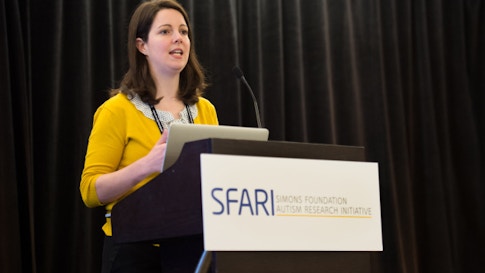
The Simons Foundation Autism Research Initiative (SFARI) gathered together some 250 current and prospective autism researchers for a social on November 17 at the Society for Neuroscience’s 2014 annual meeting in Washington, D.C. Some attendees were SFARI-funded scientists, while others were new to the field, or simply hoping to learn more about the science of autism. All of them, however, gathered to network, exchange ideas and sometimes even form new collaborations.
SFARI director Louis Reichardt welcomed the group, and included in that welcome a moment of remembrance for the late Paul Patterson, eminent scientist and SFARI Investigator, whose work focused on the potential of infection during pregnancy and immune system activation to increase the risk of autism in children.
As it did last year, SFARI held a ‘rapid-fire presentation challenge’ at the social, inviting competitive submissions from postdoctoral and graduate students to briefly present their research to the social’s guests. Selected for oral presentation this year were: ‘Cerebellar plasticity and motor learning deficits in a copy-number variation mouse model of autism’ by Claire Piochon, a postdoctoral fellow at the University of Chicago; ‘Longitudinal changes in cortical thickness in young children with autism’ by Elizabeth Smith, a postdoctoral fellow at the National Institutes of Health; ‘Mechanisms contributing to the failure of neural circuit homeostasis in MeCP2 disorders’ by Hui Lu, a postdoctoral fellow and Howard Hughes Medical Institute fellow at Baylor College of Medicine; and ‘Pharmacological modulation of inhibitory/excitatory imbalance in autism spectrum disorder’ by Laura Ajram, a Ph.D. candidate at Kings College London.
“The whole field is here, from young, exciting people making their presentations about the newest stuff, to leaders in the field, working in areas from brain tissue and brain imaging to mice and animals” said Emanuel Dicicco-Bloom, professor of neuroscience at Rutgers University in New Jersey. “It’s really the place to be.”
After the rapid-fire presentations, guests mingled, asking questions of the speakers and of SFARI science team members.
“I really enjoy this social,” said SFARI Investigator Dwight German. “There are interesting people to network with, a lot of information about autism, and the four young [scientists] that spoke have a bright future in autism research.”


